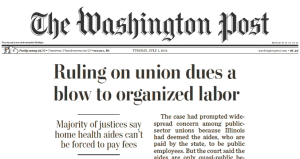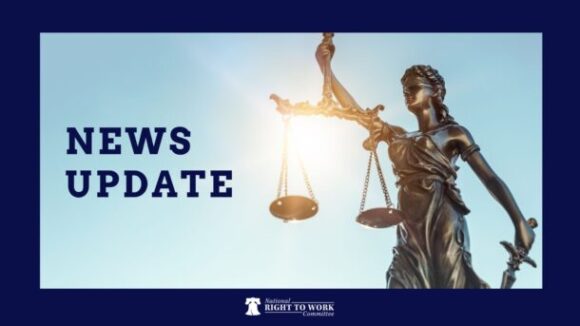DC-Area Transdev Driver Takes Case Regarding Union-Instigated Assault to Federal Appeals Court
Biden Labor Board claims ATU union did not violate law even after Transdev worker experienced slap and termination attempt from union officials

Heritage Foundation provides more Harris v. Quinn Supreme Court Opinion commentary
Rod Blagojevich, who is now serving time in federal prison, unilaterally designated these home care providers as “public employees” for the sole purpose of collective bargaining and dues payments. Illinois then negotiated a contract which required home care providers to pay dues to the Service Employees International Union.
Each year the union extracted almost $4 million from parents and relatives taking care of the elderly and infirm. And several home care providers filed suit, alleging the Illinois scheme violated their First Amendment rights by forcing them to pay dues to a union whose activities they did not support.
Today the Supreme Court ruled in their favor, concluding that forcing these providers to pay union dues violated their First Amendment rights. This is a huge victory for the National Right to Work Legal Defense Foundation, which litigated the case.
Government surveys show that only 100,000 home care providers report belonging to a union, but the SEIU alone reports 600,000 dues-paying home care members. In other words, the vast majority of home care providers do not know they receive services from a union — or that unions skim money from their reimbursement checks.
And in spite of today’s Supreme Court ruling, these workers might continue to pay dues without ever understanding that they have a First Amendment right to keep that money. If these workers don’t ask the SEIU to stop, it obviously will continue to collect dues on its own.
In fact, the SEIU probably anticipated this defeat. In February it began asking home care providers to sign cards to become full members. The fine print contained a clause authorizing the SEIU to collect dues from them—once signed they could not revoke that authorization except during a 10-day window each year. Under today’s ruling, this scheme could be challenged in federal court, but the bottom line is this: Unions will make it as hard as possible for home care providers to stop sending them money.
By creatively redefining anyone who receives a government check as a government employee, unions planned to significantly boost their membership. In addition to home care providers, unions have entered into cozy arrangements with state governments whereby parents taking care of their disabled children and individuals running at-home daycares are classified as government workers. Then they negotiated union contracts on their behalf that include mandatory dues payments — and sometimes little else.
The unions viewed this as a key way to boost membership and income, a tactic that even a long-time union officer considered reprehensible). Today’s ruling likely will put the brakes on these expansion plans. Further, other state funding regimes involving private employees designated “public employees” might be suspect; charter school employees, for example, might sue to get out of paying dues to the National Education Association union.

Biden Labor Board claims ATU union did not violate law even after Transdev worker experienced slap and termination attempt from union officials
SEIU 1199 officials concede defeat after a majority of HRI Hospital employees sign petition backing Federal Labor Board-run decertification election
NY Starbucks workers are challenging NLRB that refuses to let them hold decertification votes to remove unwanted SBWU union